The Critique of Judgment, also translated as the Critique of the Power of Judgment and more commonly referred to as the third Critique, is a philosophical work by Immanuel Kant. Critique of Judgment completes the Critical project begun in the Critique of Pure Reason and the Critique of Practical Reason (the first and second Critiques, respectively). The book is divided into two main sections: the Critique of Aesthetic Judgment and the Critique of Teleological Judgment, and also includes a large overview of the entirety of Kant's Critical system, arranged in its final form. The end result of Kant's Critical Project is that there are certain fundamental antinomies in human Reason, most particularly that there is a complete inability to favor on the one hand the argument that all behavior and thought is determined by external causes, and on the other that there is an actual "spontaneous" causal principle at work in human behavior. Immanuel Kant (1724-1804) was a German philosopher, who, according to the Stanford Encyclopedia of Philosophy is "the central figure of modern philosophy." Kant argued that fundamental concepts of the human mind structure human experience, that reason is the source of morality, that aesthetics arises from a faculty of disinterested judgment, that space and time are forms of our understanding, and that the world as it is "in-itself" is unknowable. Kant took himself to have effected a Copernican revolution in philosophy, akin to Copernicus' reversal of the age-old belief that the sun revolved around the earth.
The Critique of Judgment (Theory of the Aesthetic Judgment & Theory of the Teleological Judgment) : Critique of the Power of Judgment from the Author of Critique of Pure Reason, Critique of Practical Reason, Fundamental Principles of the Metaphysics of Morals
Starte deine 14-tägige kostenlose Probezeit
- Voller Zugriff auf Hunderttausende von Hörbüchern und E-Books in unserer Bibliothek
- Erstelle bis zu 4 Profile – inkl. Kinderprofile
- Lies und höre offline
- Abos ab € 9,99 pro Monat
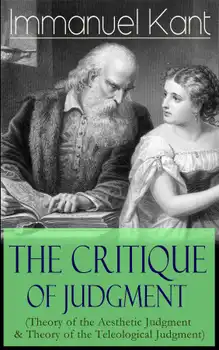
The Critique of Judgment (Theory of the Aesthetic Judgment & Theory of the Teleological Judgment) : Critique of the Power of Judgment from the Author of Critique of Pure Reason, Critique of Practical Reason, Fundamental Principles of the Metaphysics of Morals
The Critique of Judgment, also translated as the Critique of the Power of Judgment and more commonly referred to as the third Critique, is a philosophical work by Immanuel Kant. Critique of Judgment completes the Critical project begun in the Critique of Pure Reason and the Critique of Practical Reason (the first and second Critiques, respectively). The book is divided into two main sections: the Critique of Aesthetic Judgment and the Critique of Teleological Judgment, and also includes a large overview of the entirety of Kant's Critical system, arranged in its final form. The end result of Kant's Critical Project is that there are certain fundamental antinomies in human Reason, most particularly that there is a complete inability to favor on the one hand the argument that all behavior and thought is determined by external causes, and on the other that there is an actual "spontaneous" causal principle at work in human behavior. Immanuel Kant (1724-1804) was a German philosopher, who, according to the Stanford Encyclopedia of Philosophy is "the central figure of modern philosophy." Kant argued that fundamental concepts of the human mind structure human experience, that reason is the source of morality, that aesthetics arises from a faculty of disinterested judgment, that space and time are forms of our understanding, and that the world as it is "in-itself" is unknowable. Kant took himself to have effected a Copernican revolution in philosophy, akin to Copernicus' reversal of the age-old belief that the sun revolved around the earth.

Meisterwerke der Weltphilosophie : Das Gastmahl, Nikomachische Ethik, Also sprach Zarathustra, Utopia, Phänomenologie des Geistes, Neues Organon, Selbstbetrachtungen
Immanuel Kant, Sören Kierkegaard, Edmund Husserl, Ludwig Wittgenstein, Friedrich Nietzsche, - Konfuzius, Platon, Xenophon, - Aristoteles, Lao Tse, Marcus Tullius Cicero, Marcus Aurelius, Plotin, Thomas von Aquin, Niccolò Machiavelli, Thomas Morus, Giordano Bruno, Michel de Montaigne, René Descartes, Francis Bacon, Blaise Pascal, Baruch Spinoza, Gottfried Wilhelm Leibniz, David Hume, Jean-Jacques Rousseau, Friedrich Schelling, John Locke, Georg Wilhelm Hegel, John Stuart Mill, Karl Marx
book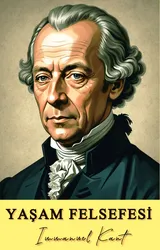
Yaşam Felsefesi
Immanuel Kant
book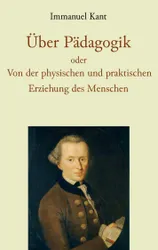
Über Pädagogik oder Von der physischen und praktischen Erziehung des Menschen
Immanuel Kant
book
La Paz Perpetua :
Immanuel Kant
audiobook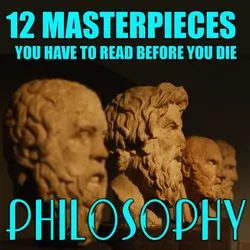
12 Masterpieces You Have to Read Before You Die. Philosophy
Niccolo Machiavelli, Tommaso Campanella, Francis Bacon, Thomas More, John Stuart Mill, Immanuel Kant, Kahlil Gibran, Leo Tolstoy, G.K. Chesterton, Henry David Thoreau
audiobook
Crítica de la Razón Pura
Immanuel Kant
audiobook
An Answer to the Question: What is Enlightenment?
Immanuel Kant
audiobook
Preisschrift über die Fortschritte der Metaphysik
Immanuel Kant
book
Allgemeine Naturgeschichte und Theorie des Himmels : Die kosmologische Revolution der Aufklärung: Naturgesetze und die Struktur des Universums
Immanuel Kant
book
Immanuel Kant zum Reinhören
Immanuel Kant
audiobook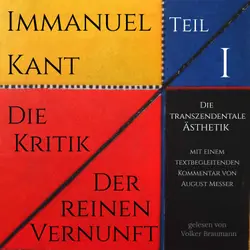
Die Kritik der reinen Vernunft : Die transzendentale Ästhetik
Immanuel Kant
audiobook
Ikuiseen rauhaan
Immanuel Kant
audiobook